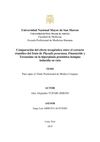
Search
for
Sort by
Research
690-720 / 1000+ results

research Association of Androgenetic Alopecia with Benign Prostatic Hyperplasia: A Case Control Study
Hair loss linked to prostate enlargement; stress and family history important factors.

research Comparison of the Therapeutic Effect Between Ethanolic Extract of Physalis Peruviana Fruit, Finasteride, and Terazosine on Benign Prostatic Hyperplasia Induced in Rats
Physalis peruviana extract is more effective in treating benign prostatic hyperplasia in rats than finasteride and terazosine.

research Differential Diagnosis of Male and Female Pattern Hair Loss
Detailed history and physical examination are crucial for diagnosing hair loss.

research A Case of Hidradenitis Suppurativa Treated Effectively by Finasteride
Finasteride effectively treated hidradenitis suppurativa.

research Association Between Androgenetic Alopecia and Cardiovascular Risk Factors According to BASP Classification in Korean Androgenetic Alopecia
Korean patients with androgenetic alopecia may have a higher risk of heart-related health issues and could benefit from early heart screening and healthier lifestyles.

research Androgenetic Alopecia, Prostate Volume, And Urinary Symptoms: Is There A Relationship? A Case-Control Study
Hair loss, prostate size, and urinary issues are related due to androgen effects.

research Response to Article 'Depression Circumstantially Related to the Administration of Finasteride for Androgenetic Alopecia' (Journal of Dermatology, 29, 665-669, 2002)
Finasteride's link to depression is questionable due to study flaws and potential bias.

research Therapeutic Approach to Androgenetic Alopecia
Treatments for hair loss include hormone modifiers, minoxidil, and hair transplant surgery.

research Revised 2003 Consensus on Diagnostic Criteria and Long-Term Health Risks Related to Polycystic Ovary Syndrome (PCOS)
The 2003 consensus updated PCOS diagnosis criteria and linked PCOS to higher risks of diabetes and heart problems, recommending lifestyle changes to lower these risks.

research Standards of Care for the Health of Transsexual, Transgender, and Gender-Nonconforming People, Version 7
The guidelines recommend informed consent for gender-affirming treatments and stress the importance of personalized, culturally sensitive care for transgender individuals.

research The Androgen Excess and PCOS Society Criteria for the Polycystic Ovary Syndrome: The Complete Task Force Report
The report concludes that PCOS is mainly a condition of excess male hormones and its definition may change as new information is discovered.

research Reduced Cardiotoxicity and Comparable Efficacy in a Phase III Trial of Pegylated Liposomal Doxorubicin HCl (CAELYX/Doxil) Versus Conventional Doxorubicin for First-Line Treatment of Metastatic Breast Cancer
Pegylated liposomal doxorubicin is as effective as conventional doxorubicin but causes fewer heart problems and side effects.

research The Rotterdam Study: Objectives And Design Update
The Rotterdam Study investigates diseases in older adults and has produced many research findings.

research The Nuclear Vitamin D Receptor: Biological and Molecular Regulatory Properties Revealed
The vitamin D receptor is crucial for bone health and affects various body systems, with mutations potentially leading to disease.

research Diagnosis and Treatment of Polycystic Ovary Syndrome: An Endocrine Society Clinical Practice Guideline
The guideline suggests using specific criteria to diagnose PCOS, recommends various treatments for its symptoms, and advises screening for related health issues.

research The Biology of Hair Follicles
Hair follicle biology advancements may lead to better hair growth disorder treatments.

research The Nuts and Bolts of Low-Level Laser Therapy
Low-level Laser Therapy may help reduce inflammation, pain, and aid healing, but more research is needed to confirm its effectiveness and establish standard treatment guidelines.

research Androgen Excess in Women: Experience with Over 1000 Consecutive Patients
Most women with excess male hormones have Polycystic Ovary Syndrome, and hormonal therapy can improve symptoms but may cause side effects.

research Endocrine Treatment of Transsexual Persons: An Endocrine Society Clinical Practice Guideline
The guideline recommends mental health involvement in diagnosing gender identity disorder and outlines hormone and surgical treatment protocols, emphasizing safety, informed consent, and long-term monitoring.

research Lgr5 Marks Cycling, Yet Long-Lived, Hair Follicle Stem Cells
Lgr5 is a marker for active, long-lasting stem cells in mouse hair follicles.

research Mesenchymal Stem Cell Secretome: Toward Cell-Free Therapeutic Strategies in Regenerative Medicine
The secretions of mesenchymal stem cells could be used for healing without using the cells themselves.

research The Hair Follicle as a Dynamic Mini-Organ
Hair follicles are complex, dynamic mini-organs that help us understand cell growth, death, migration, and differentiation, as well as tissue regeneration and tumor biology.

research Finasteride in the Treatment of Men with Androgenetic Alopecia
Finasteride safely and effectively treats male pattern hair loss, but may cause reversible sexual issues and harm male fetuses.

research Early and Midterm Outcome After Off-Pump and On-Pump Surgery in Beating Heart Against Cardioplegic Arrest Studies (BHACAS 1 and 2): A Pooled Analysis of Two Randomized Controlled Trials
Off-pump heart surgery reduces complications without affecting survival rates compared to on-pump surgery.

research Vitiligo: A Comprehensive Overview
Vitiligo is a skin condition causing white spots, more common in women, often starts before age 20, and can affect mental health.

research Growth of the Hair
Hair growth is cyclic and influenced mainly by local factors.

research Mechanisms and Applications of the Anti-Inflammatory Effects of Photobiomodulation
Photobiomodulation therapy using red and near-infrared light can reduce inflammation and aid in healing various conditions.

research Non-Binary or Genderqueer Genders
The document concludes that non-binary individuals need compassionate support and recognition in healthcare, without being pathologized.

research Proteasome Inhibitors: An Expanding Army Attacking a Unique Target
Proteasome inhibitors are promising treatments for various cancers, autoimmune diseases, and other conditions.